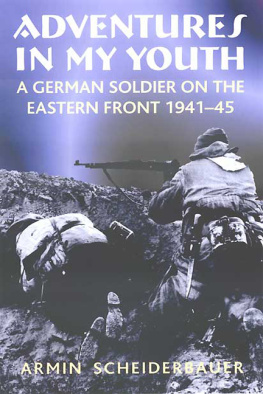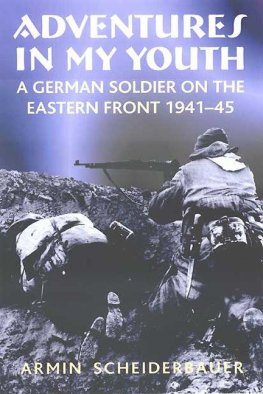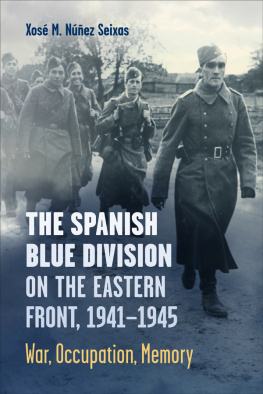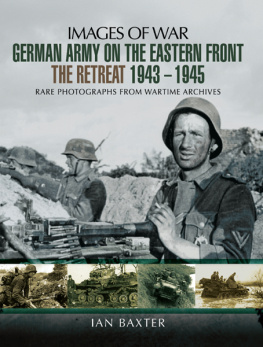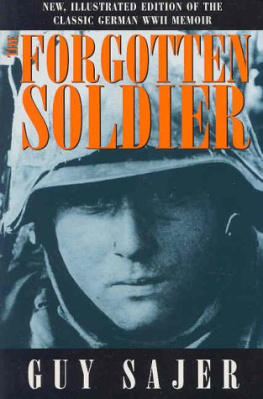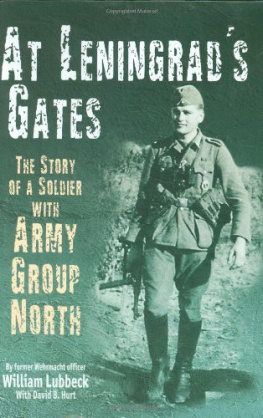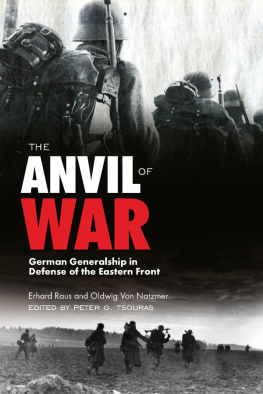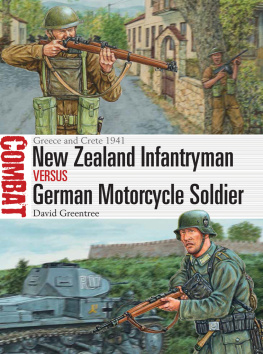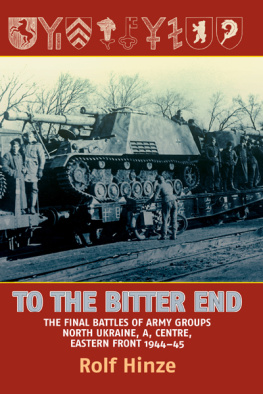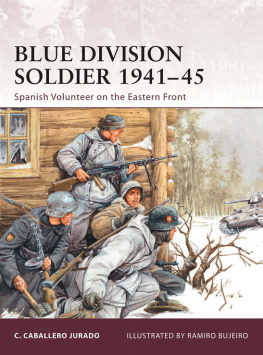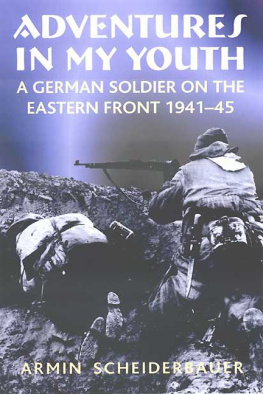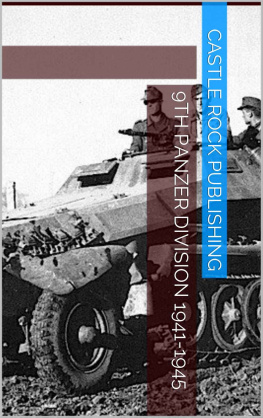
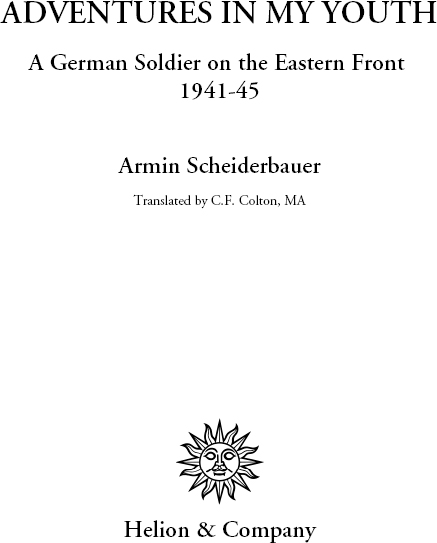
Helion & Company Limited
26 Willow Road
Solihull
West Midlands
B91 1UE
England
Tel. 0121 705 3393
Fax 0121 711 4075
Email: info@helion.co.uk
Website: www.helion.co.uk
Published by Helion & Company Limited 2003
Paperback reprint 2010
eBook edition 2011
Designed and typeset by Helion & Company Limited, Solihull, West Midlands
Cover designed by Bookcraft Limited, Stroud, Gloucestershire
Printed by Henry Ling Ltd, Dorchester, Dorset
This English edition Helion and Company 2003
Hardcover ISBN 9781874622062
Paperback ISBN 9781906033774
Digital ISBN 9781907677496
British Library Cataloguing-in-Publication Data.
A catalogue record for this book is available from the British Library.
All rights reserved. No part of this publication may be reproduced, stored in a retrieval system, or transmitted, in any form, or by any means, electronic, mechanical, photocopying, recording or otherwise, without the express written consent of Helion & Company Limited.
Cover photograph used courtesy of Bildarchiv Preuischer Kulturbesitz.
Prologue written by Dr Sarah Williams.
For details of other military history titles published by Helion & Company contact the above address, or visit our website: www.helion.co.uk.
We always welcome receiving book proposals from prospective authors.
The author could be described as a veteran in every sense of the word, even though he was only aged 21 when the war ended. Armin Scheiderbauer served as an infantry officer with the 252nd Infantry Division, German Army, and saw four years of bitter combat on the Eastern Front, being wounded six times. This is an outstanding personal memoir, written with great thoughtfulness and honesty.
Scheiderbauer joined his unit at the front in 1942, and during the following years saw fierce combat in many of the largest battles on the Eastern Front. His experiences of the 1943-45 period are particularly noteworthy, including his recollections of the massive Soviet offensives of summer 1944 and January 1945. Participating in the bitter battles in West Prussia, he was captured by the Soviets and not released until 1947.
Adventures in my Youth is a unique memoir - the author originally wrote it only for his daughter.
1
August 1941-June 1942: Call-up and training
Aged 17 years - called-up for basic training; aged 18 years - training complete, appendicitis
O n 1 August 1941, I had to be in the Jger barracks at St Avold in the Westmark by 3pm. If the word Westmark had not been added, I would not have had even a vague idea as to where my destination was. Westmark was the name given to that region which had been added on to the Reich after the surrender of France. Whether that included only the former German Alsace and Lorraine, or more, no one knew. In any event, I had to seek the aid of a large-scale map to find St Avold which, I finally discovered lay between Saarbrcken and Metz in Lorraine. 1 August was not a normal call-up deadline, the normal dates were 1 April and 1 October. It turned out that there were in fact only a few of us young lads who turned up on 1 August 1941, in accordance with our call-up orders. In the meantime, Mum was in the Liesertal with Rudi and Liesl, so I went for a few days to where they were staying in Zlabing Post Lieserbrcke. For 31 July they had planned a trip out to the parsonage at Eisentratten to visit the family of Pastor Schimik, a school friend of Fathers.
From there, I began my journey on the regular afternoon post bus. The journey took me first as far as Spittal on the Drau, and from there by rail via Salzburg. During the night we crossed southern Germany to Saarbrcken. There I left the express train to get on an ordinary passenger train going towards Metz. On the platform I met a boy who was looking around just as I was. He was dragging along two big suitcases. I spoke to him and it turned out that we were both going to the same place. He was Ludwig (Wiggerl) Popovsky, the son of a Vienna tram driver. In him I had found my first comrade. We remained close through two years, more or less.
Neither of us knew or had any explanation why we had ended up in that particular district. We also knew nothing about the unit to which we had been assigned, namely the 2nd Company of Infantry Ersatz Battalion 7, nor from which part of the country its members came. Wiggerl, like me, had left it up to chance as to what infantry unit he would be assigned. The mystery was resolved shortly after we arrived. First, after getting out at St Avold station, we had to lug our heavy luggage two kilometres over a mountain, behind which lay the little town. At the edge of it was the Jger barracks.
We arrived at about 2.30pm. Although we were not yet soldiers, we had nevertheless to experience for ourselves the truth of the saying that half his life the soldier has to wait in vain. There are certainly good reasons for that. At 3pm, however, to a certain extent in an official manner, there began the new and serious part of my life. It turned out that altogether there were four of us soldiers who had been provisionally accepted as officer candidates. Most were from Lower Silesia. One came from the Ruhr area, two from Trautenau in Lower Bohemia and the two of us, Popovsky and I, came from Vienna and the Vienna area.
The battalion stationed in St Avold was the Ersatz unit for Infantry Regiment 7, in peacetime based in Schweidnitz. We found out that the entire Silesian Ersatz Army Corps had been moved into the Westmark. In the French campaign Regiment 7 had been commanded by a colonel from Vienna. At that time, replacements had been added to the regiment to the strength of almost a battalion of men from Vienna. It was the case, right up to the end of the war, that in almost every company I came across there was at least one Viennese or Austrian.
For my part I often regretted that I had made no attempt to join a unit from my homeland. Before I became a soldier I had dreamed how grand it must be to march in the victory parade through the Ringstrasse with the returning troops. But later my regret was because I had no close wartime comrades living nearby. That became clear to me when eventually I sat on the Linz regional high court with my colleagues Zauner and Hemetsberger. They had been in the Linz Division, the 45th. Zauner was among the men of the Linz Infantry Regimentthe sons of the region and of the citywho marched off to war from the castle barracks. Hemetsberger had been an artillery officer in the Division.
Immediately after installation, under which general heading I include being assigned a barrack room and a bed, and obtaining items of military uniform and equipment, there began the rigorous service involved in basic training. It lasted six weeks. It turned out that this too had been a kind of test. Of the seventeen of us who had joined on 1 August, six were dismissed because they did not meet requirements. Because they were not yet of age for military service they were sent back home. We could easily imagine with what mockery they would be welcomed back to school by their classmates who had stayed behind, after their experience of a holiday that brought so much trouble.
So, eleven of us remained together. Our service went on, apart from the normal work of the barracks, under the supervision of a Leutnant , a NCO, and a Gefreiter who, at the same time, was senior soldier in the barrack room. The eleven of us were Hans Alterman from Gottesberg in Silesia, Walter Borrmann from Breslau, Walter Henschel from Reichenbach in the Eulengebirge, Hans Bernt and Gottfried Bergmann from Liegnitz, Jochen Fiedler from Glogau, Diesel and Helmut berla from Trautenau, Pohlmann from Wuppertal, together with Popovsky and me.

